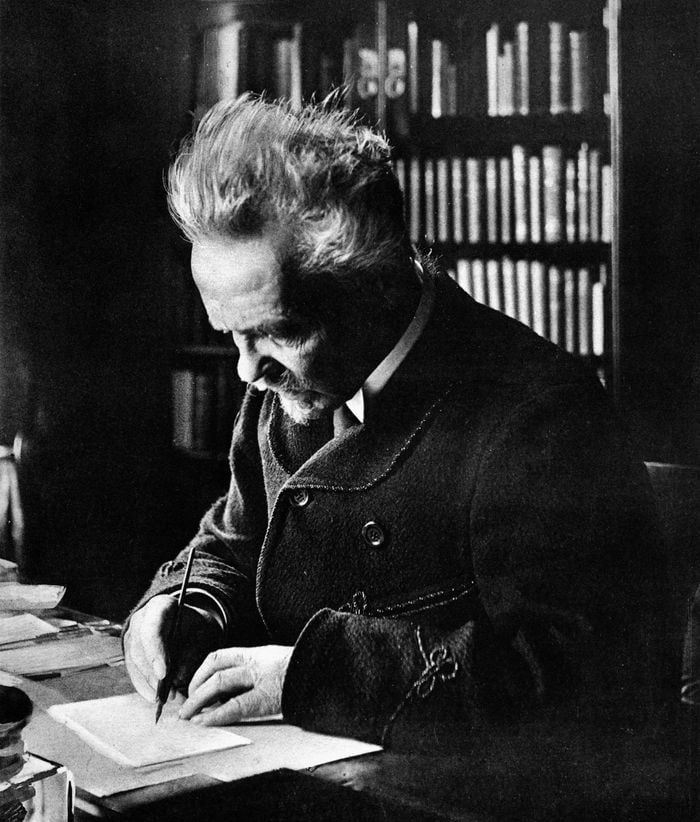Petronius (Died 66 A.D.)
Gaius Petronius Arbiter was born some time early in the First Century of the Christian era, and committed suicide in the year 66. Writer, government official, dilettante and friend of Nero, he “had idled into fame,” as Tacitus tells us. His best-known work, The Satyricon, is a strange straggling sort of satirical novel, into which he introduced this short masterpiece, The Matron of Ephesus. The tale is supposed to be in the manner of one of the so-called lost Milesian Tales, a collection renowned for its cynical oudook on humanity in general and woman in particular. This brief story (in one form or another) is to be found running through all literature, especially the literature written by men. The present version is a revision (by the editors) of two older versions.
The Matron of Ephesus
From The Satyricon
A certain matron of Ephesus was so notably pure that women came from afar to look upon her. When her husband was buried, she was not satisfied with the usual custom of following the body with loosened hair and beating her breast in the presence of the people: she accompanied her dead spouse right into the sepulcher—which was in the Greek style, underground—and there remained to watch and weep by day and by night. Her parents and relations were unable to prevent her from thus torturing herself, and remaining in the sepulcher to die of hunger. The civil officials at last left in despair.
The matron lived through the fifth day without eating, and was grieved for by all as a shining example to all womenkind. A faithful maidservant sat by the wretched woman, shed the appropriate number of tears, and kept the lamp burning.
Word spread through the city, and every one agreed that it was a unique example of conjugal love and fidelity.
Meantime, the provincial governor crucified certain thieves near the sepulcher where the matron was weeping over the body of her late husband, and a soldier was commanded to keep guard over the crosses, to prevent the bodies from being taken down and buried. The following night he perceived a light shining brightly among the trees and heard the moans of the woman. Like all human beings, he was curious, and desired to know who was groaning, and what was the cause of it.
He therefore entered the sepulcher, and on seeing a beautiful woman, stopped short and was as deeply moved as though he had seen an omen or a ghost from the nether world. The moment he set eyes on the body and remarked the matron`s tears, and her face scarred by the marks of fingernails, he understood: she was desperate in her love for the man who was dead. He then brought his frugal supper into the sepulcher, and begged the matron not to give way so to a grief that was useless, nor break her heart in weeping. All men, he said, had the same fate and the same last resting-place.
Maidservant
But she was ill-pleased by such commonplace consolation, and smote her breast more violently than ever, tearing out her hair and throwing it upon the body before her. Still, the young soldier did not leave. He tried to give the woman food. Though she resisted, her maidservant was won over by the smell of the wine, and stretched out her hand for the supper that was offered her. After she was fortified by food and drink, she strove to win over her mistress. “How,” she asked, “will you be benefited, if you starve to death and bury yourself alive, dying before Destiny has demanded your soul? Do you imagine that your mourning can be acceptable to the body or the soul of a man who is dead and buried? Why not rather begin your life anew? Why not forget this misguided fidelity— adhered to only by women—and enjoy the daylight as long as the gods allow? This cold body ought to be a warning to you to enjoy life to the utmost.”
Now, generally, one gives heed when one is asked to eat food or to live, and the matron was both hungry and thirsty after five days` fasting; she allowed her resolution to be broken. She ate as greedily as the maidservant had eaten. Those who are well-fed are easily tempted, and the soldier set about to conquer the matron`s virtue, by the same pleasant and persuasive means he had used before. The chaste matron perceived that he was an attractive young man, and by no means a fool. The maidservant was sympathetic, and quoted the words, “Do you seek to struggle against a passion that is pleasing to you? Do you not remember in whose country you are?”
To make a long story short, having overcome certain of the matron`s scruples, the soldier succeeded in overcoming her remaining scruples.
They were together not only on that first night, but on the second and the third. The gates of the sepulcher were closed, so that if any friend or stranger had come, he would have imagined that the very virtuous woman had died in the presence of her husband`s body. The soldier was greatly pleased by the matron`s charms, and with their uninterrupted love; he bought such delicate viands as his pay would permit, and brought them to the sepulcher when darkness came.
The parents of one of the thieves who had been crucified, perceiving that the soldier was not strictly guarding the crosses, took down the body of their son and buried it. Next morning, seeing the body gone, the soldier knew what his punishment would be, and went and told the woman. He would, he declared, kill himself with his sword rather than be sentenced by a military court, and told her to make room for her lover to lie beside her late husband.
But the lady was as compassionate as she was pure. “May the gods forbid,” said she, “that I should lay eyes at one time on the corpses of the two men who are dearest to me! It were better to hang up a dead body than to kill a breathing man.” And therewith she told the soldier to take the husband`s body from its place and put it upon the cross that was vacant. The soldier at once acted upon the matron`s clever suggestion, and the next day people wondered how the dead man had been able to crucify himself.
Read More about The Fury part 4








